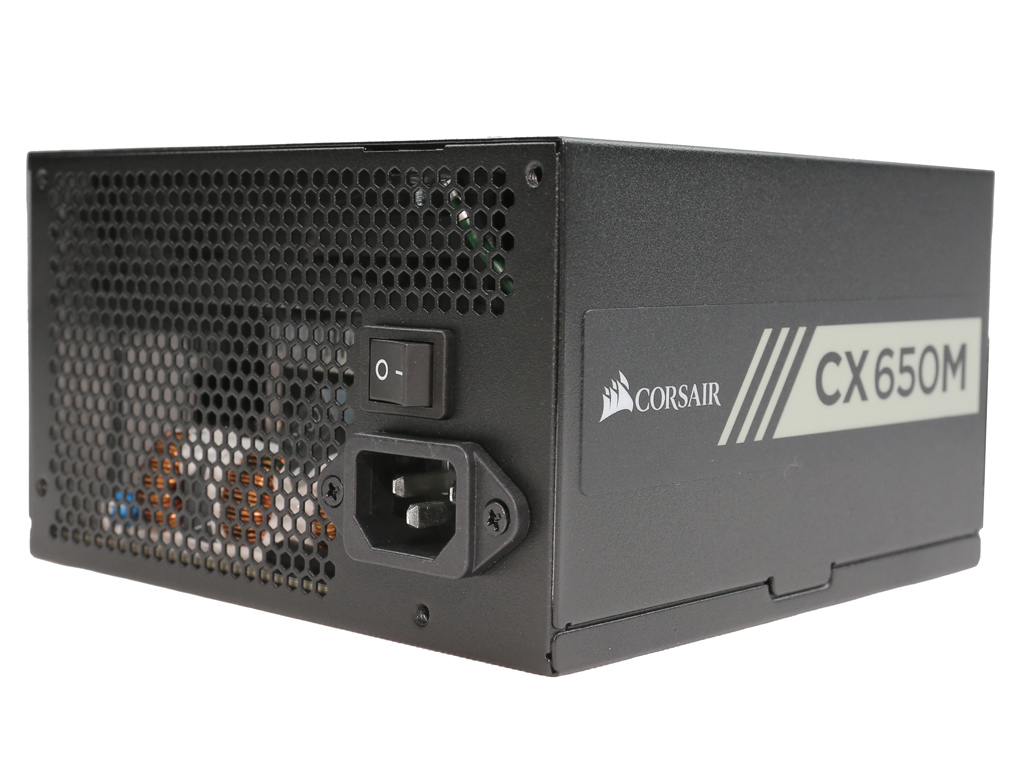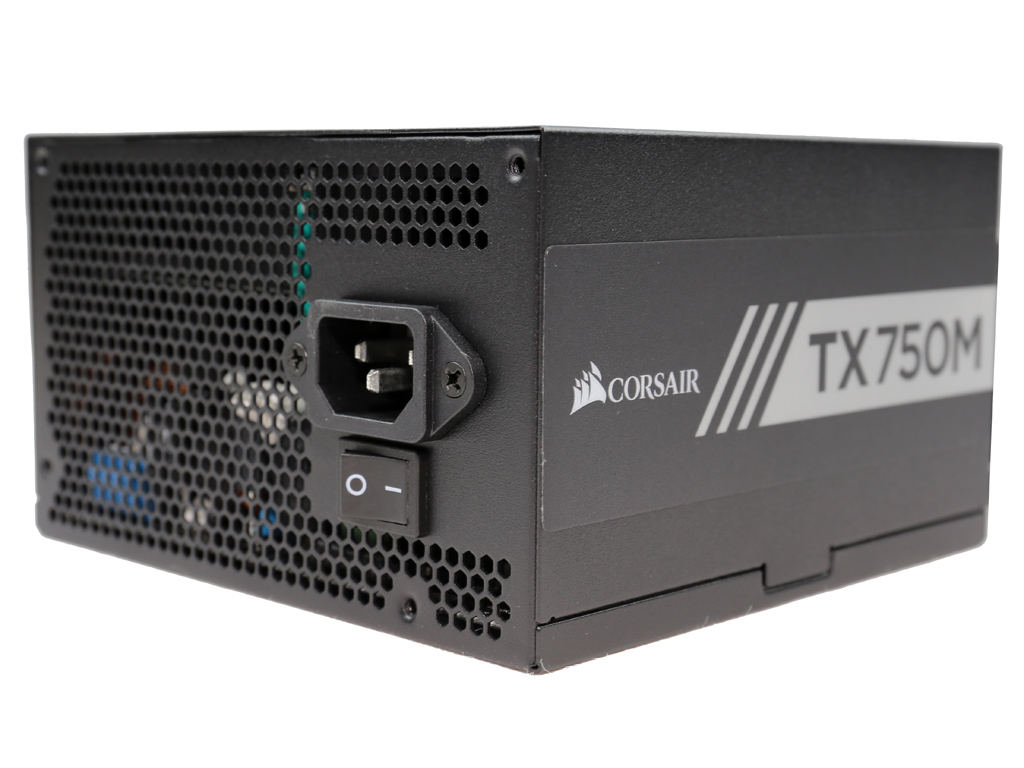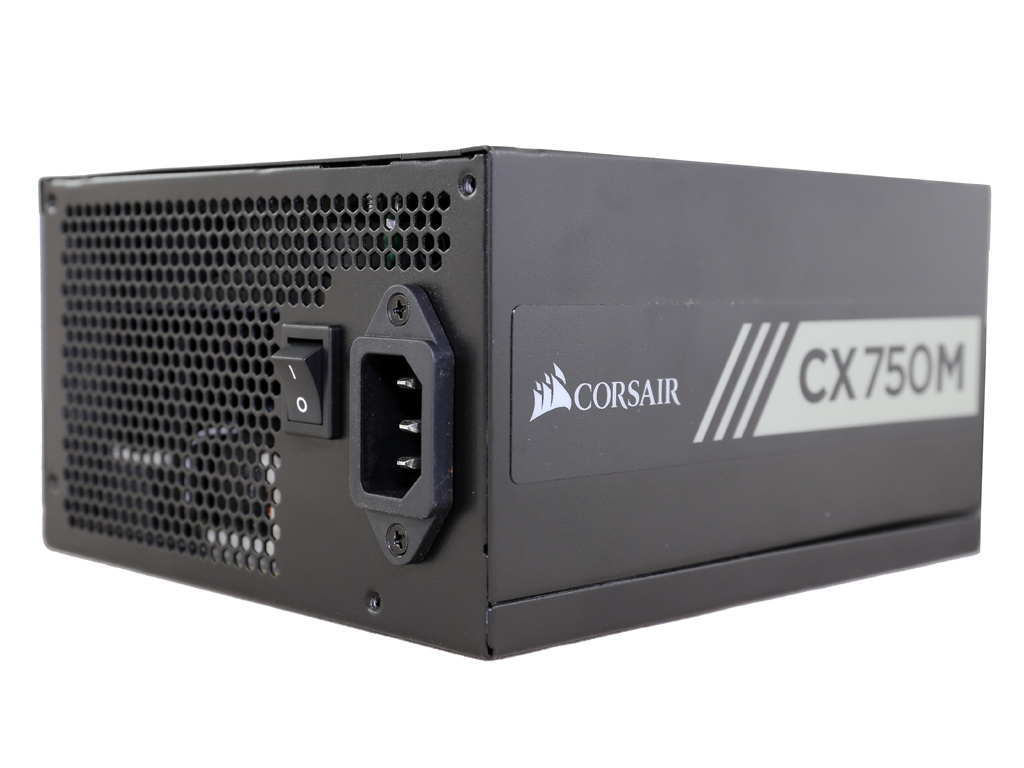Corsair TX750M PSU Review
Why you can trust Tom's Hardware
Load Regulation, Hold-Up Time & Inrush Current
To learn more about our PSU tests and methodology, please check out How We Test Power Supply Units.
Primary Rails And 5VSB Load Regulation
Load Regulation testing is detailed here.
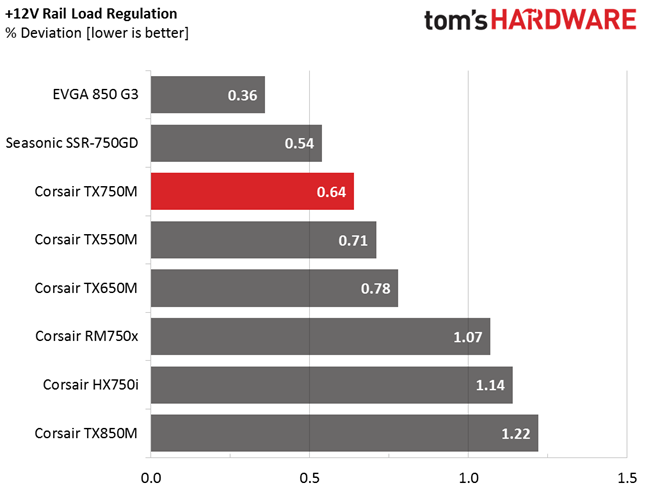
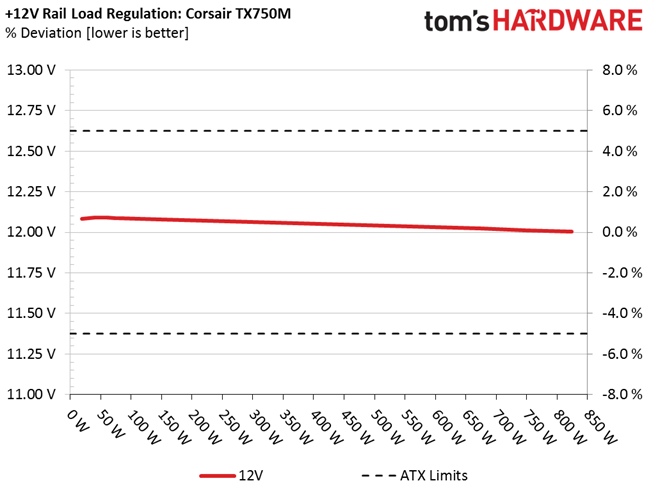
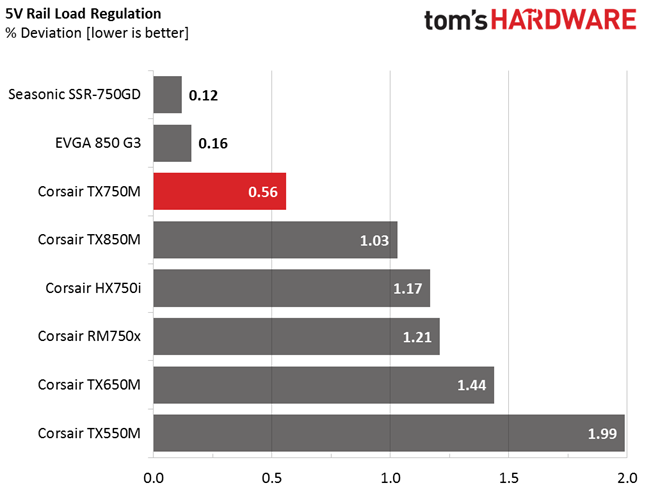
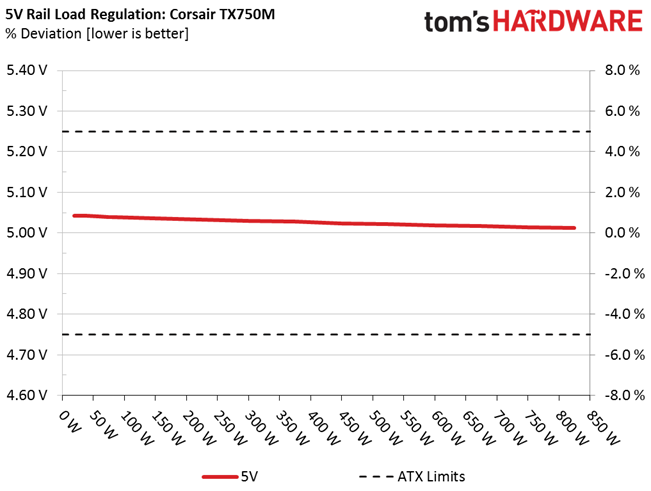
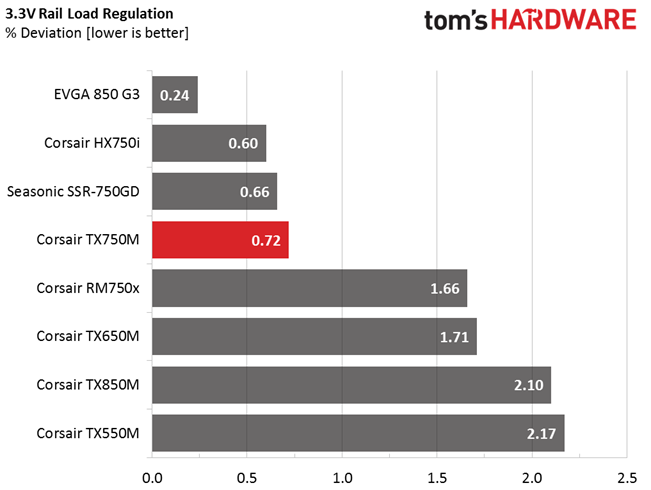
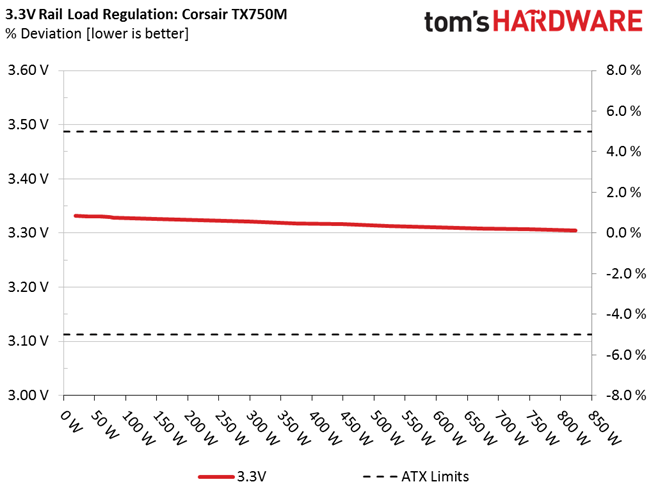
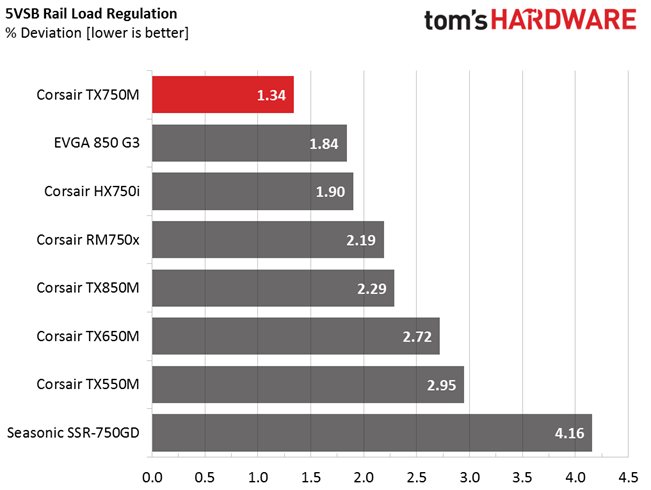
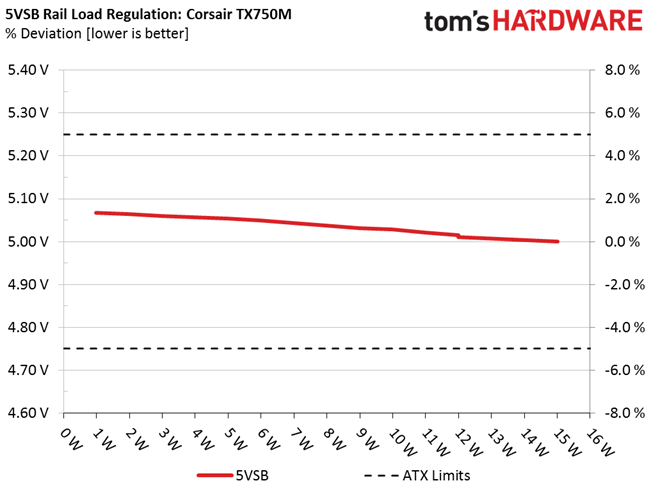
Hold-Up Time
Our hold-up time tests are described in detail here.
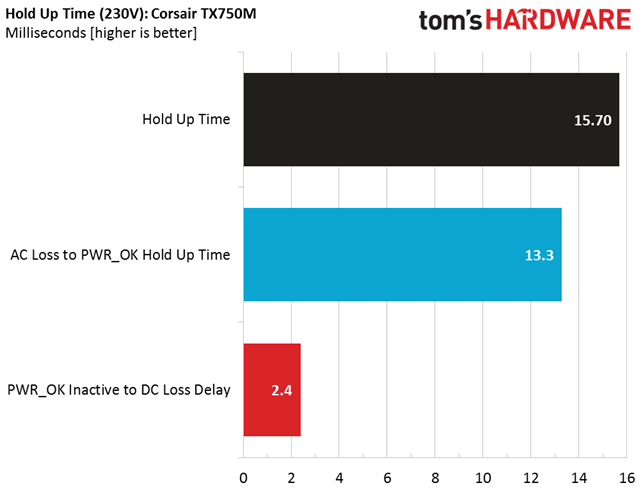
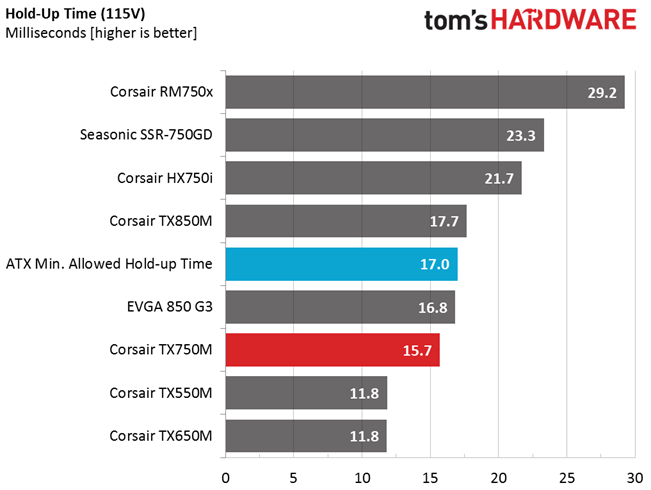
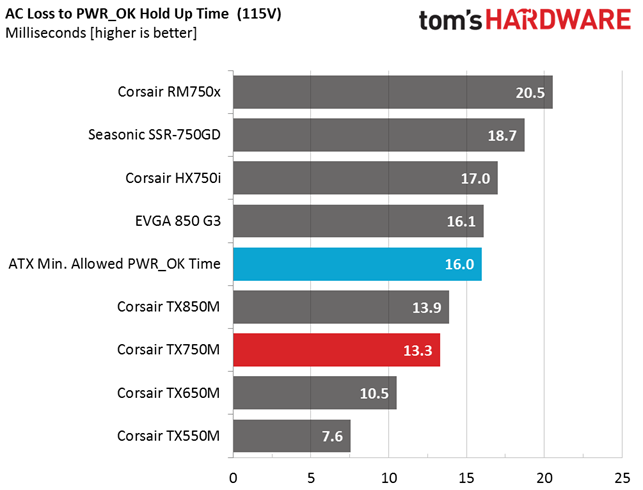
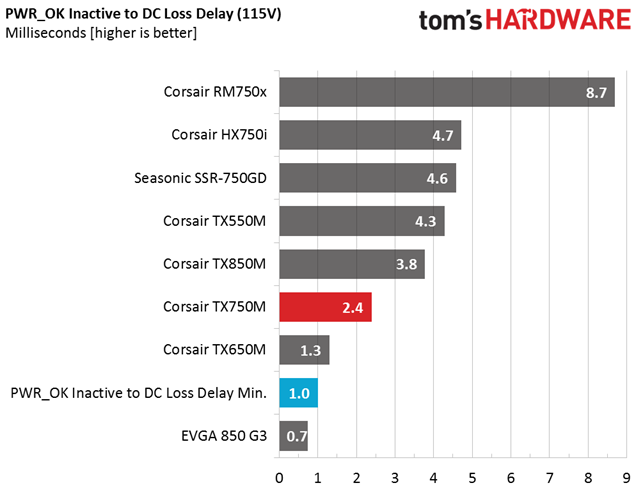
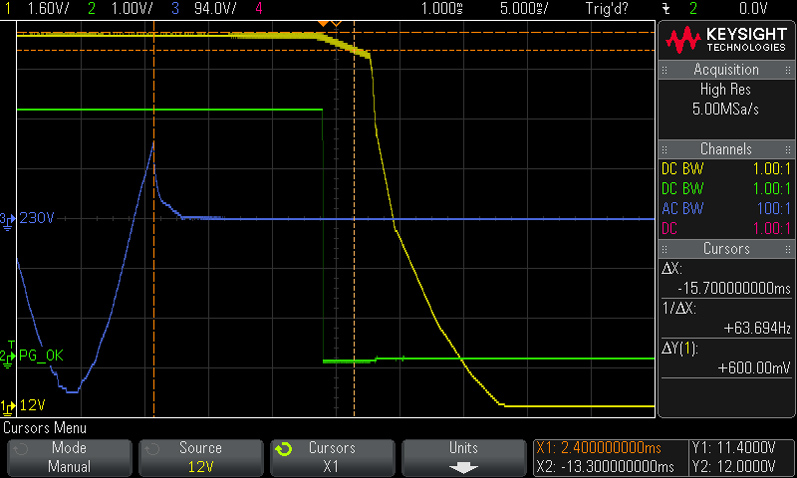
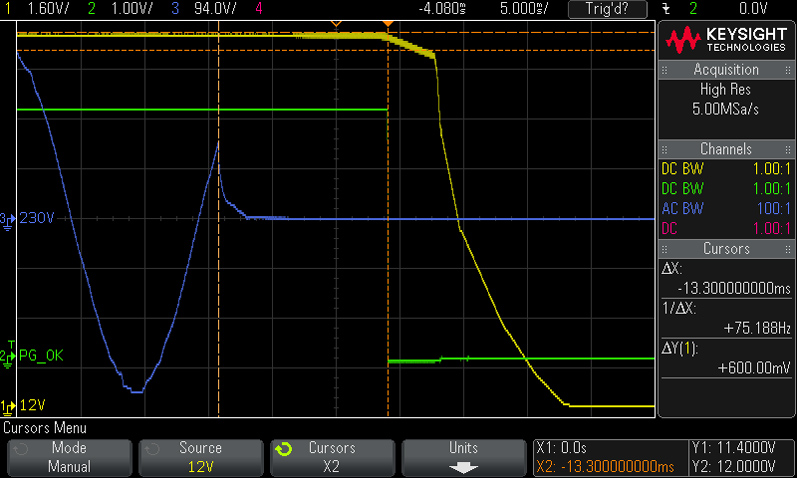
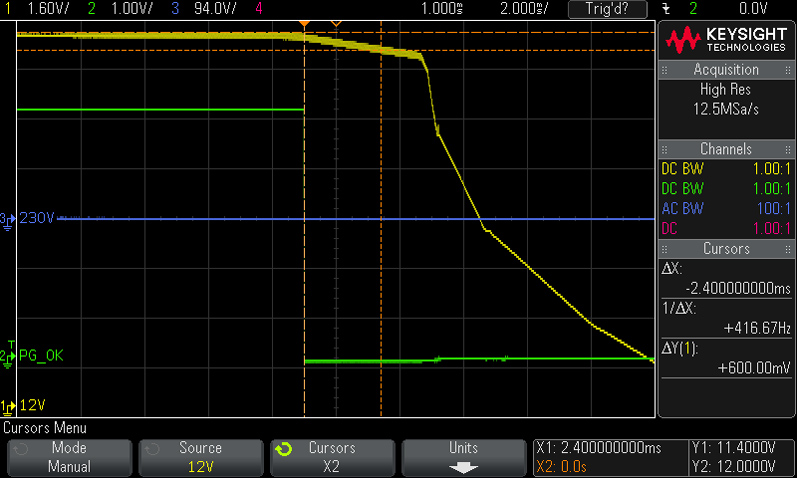
The TX750M's hold-up time is lower than 17ms, and its power-good signal doesn't exceed 16ms like the ATX spec requires. At least the power-good signal is accurate, though.
Of the entire TX-M family, only Corsair's TX850M exceeds a 17ms hold-up time. Unfortunately, its power-good signal drops too early. In budget-oriented PSUs like these, smaller bulk caps are used to save money, inevitably leading to lower hold-up times than what we find from high-end PSUs. Regardless of price, though, every PSU is expected to satisfy the ATX specification if it's manufacturer claims compliance.
Inrush Current
For details on our inrush current testing, please click here.
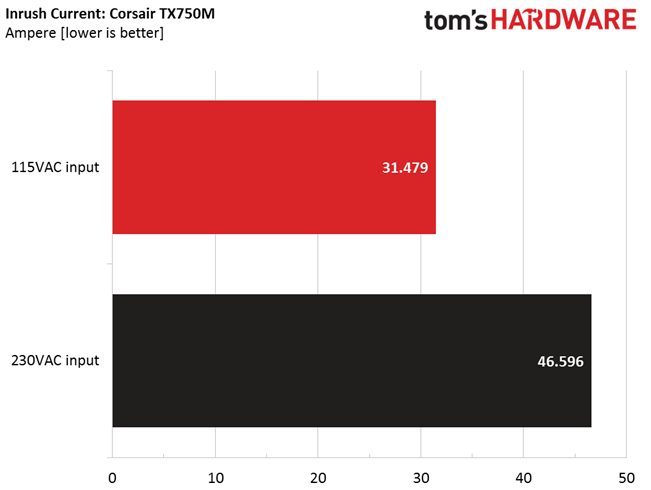
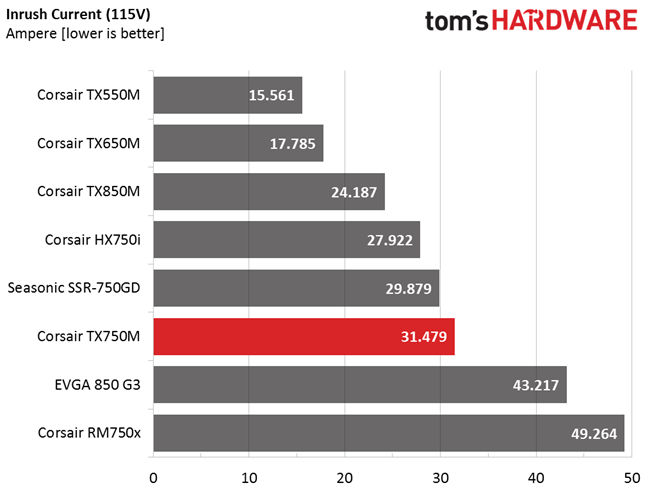
The inrush current is normal for a 750W unit.
Get Tom's Hardware's best news and in-depth reviews, straight to your inbox.
Load Regulation And Efficiency Measurements
The first set of tests reveals the stability of the voltage rails and the TX750M's efficiency. The applied load equals (approximately) 10 to 110 percent of the PSU's maximum load in increments of 10 percentage points.
We conducted two additional tests. During the first, we stressed the two minor rails (5V and 3.3V) with a high load, while the load at +12V was only 0.1A. This test reveals whether a PSU supports Intel's C6/C7 power states or not. In the second test, we determined the maximum load the +12V rail could handle with minimal load on the minor rails.
| Test # | 12V | 5V | 3.3V | 5VSB | DC/AC (Watts) | Efficiency | Fan Speed | Fan Noise | Temps (In/Out) | PF/AC Volts |
|---|---|---|---|---|---|---|---|---|---|---|
| 1 | 4.402A | 1.985A | 1.982A | 0.986A | 74.794 | 84.959% | 1250 RPM | 29.8 dB(A) | 38.74°C | 0.988 |
| 12.088V | 5.039V | 3.329V | 5.054V | 88.035 | 40.59°C | 115.12V | ||||
| 2 | 9.841A | 2.971A | 2.974A | 1.186A | 149.730 | 89.007% | 1300 RPM | 30.5 dB(A) | 39.08°C | 0.982 |
| 12.081V | 5.036V | 3.326V | 5.049V | 168.223 | 41.34°C | 115.11V | ||||
| 3 | 15.640A | 3.478A | 3.486A | 1.385A | 224.895 | 90.406% | 1395 RPM | 31.2 dB(A) | 39.63°C | 0.989 |
| 12.073V | 5.033V | 3.323V | 5.043V | 248.760 | 42.16°C | 115.11V | ||||
| 4 | 21.431A | 3.975A | 3.972A | 1.587A | 299.747 | 90.765% | 1455 RPM | 32.4 dB(A) | 40.18°C | 0.992 |
| 12.065V | 5.030V | 3.321V | 5.038V | 330.246 | 43.09°C | 115.11V | ||||
| 5 | 26.896A | 4.973A | 4.972A | 1.784A | 374.736 | 90.595% | 1545 RPM | 34.2 dB(A) | 40.92°C | 0.994 |
| 12.056V | 5.028V | 3.318V | 5.032V | 413.641 | 44.37°C | 115.11V | ||||
| 6 | 32.359A | 5.973A | 5.970A | 1.987A | 449.658 | 90.196% | 1660 RPM | 36.1 dB(A) | 41.57°C | 0.995 |
| 12.048V | 5.024V | 3.316V | 5.028V | 498.537 | 45.75°C | 115.11V | ||||
| 7 | 37.839A | 6.976A | 6.971A | 2.190A | 524.660 | 89.619% | 1730 RPM | 37.4 dB(A) | 42.21°C | 0.996 |
| 12.039V | 5.021V | 3.313V | 5.021V | 585.434 | 46.88°C | 115.10V | ||||
| 8 | 43.323A | 7.972A | 7.971A | 2.391A | 599.570 | 88.888% | 1840 RPM | 39.8 dB(A) | 43.17°C | 0.996 |
| 12.030V | 5.019V | 3.311V | 5.015V | 674.525 | 48.58°C | 115.10V | ||||
| 9 | 49.248A | 8.476A | 8.488A | 2.393A | 674.653 | 88.108% | 1840 RPM | 39.8 dB(A) | 44.20°C | 0.997 |
| 12.022V | 5.017V | 3.308V | 5.011V | 765.713 | 50.41°C | 115.10V | ||||
| 10 | 54.923A | 8.981A | 8.979A | 3.000A | 749.514 | 87.199% | 1840 RPM | 39.8 dB(A) | 45.28°C | 0.997 |
| 12.013V | 5.014V | 3.307V | 5.000V | 859.544 | 52.71°C | 115.12V | ||||
| 11 | 61.198A | 8.984A | 8.984A | 3.000A | 824.393 | 86.357% | 1840 RPM | 39.8 dB(A) | 46.55°C | 0.995 |
| 12.005V | 5.012V | 3.305V | 4.997V | 954.631 | 55.15°C | 115.11V | ||||
| CL1 | 0.101A | 16.027A | 16.004A | 0.004A | 134.877 | 82.478% | 1670 RPM | 36.2 dB(A) | 43.48°C | 0.983 |
| 12.075V | 5.025V | 3.318V | 5.058V | 163.530 | 47.58°C | 115.12V | ||||
| CL2 | 62.451A | 1.003A | 1.003A | 1.002A | 763.756 | 87.870% | 1840 RPM | 39.8 dB(A) | 45.23°C | 0.997 |
| 12.015V | 5.021V | 3.316V | 5.035V | 869.185 | 51.93°C | 115.11V |
Our TX750M sample registers the best load regulation among all TX-Ms, especially on the minor and 5VSB rails. This is noteworthy, since normally the lowest-capacity models based on a given platform achieve superior load regulation. In this case, it's the second-strongest TX-M faring most admirably.
According to 80 PLUS, the TX750M satisfies its Gold level's requirements, even under high ambient temperatures. Corsair usually makes absolutely sure its specifications are accurate, and that's clearly the case here.
Despite ample efficiency, we're less satisfied by Corsair's fan profile under tough conditions. Even with less than 100W load, the fan spins at 1250 RPM, generating close to 30 dB(A). At least the TX750M's top speed is capped at 1840 RPM, keeping noise output under 40 dB(A). Still, we think the fan profile could be less aggressive. After all, this is an 80 PLUS Gold-rated PSU. We suspect that a long warranty has Corsair playing it safe in the temperature department.
MORE: Best Power Supplies
MORE: How We Test Power Supplies
MORE: All Power Supply Content
Current page: Load Regulation, Hold-Up Time & Inrush Current
Prev Page Teardown & Component Analysis Next Page Efficiency, Temperature & Noise
Aris Mpitziopoulos is a contributing editor at Tom's Hardware, covering PSUs.
-
NinjaNerd56 I have one of the 'sister' versions of this PSU. I like it a lot. My case is all air cooled, so I never hear the fan on the Corsair.Reply -
Dom_79 So I guess this is a "re-release" of the TX-xxxM semi-modular line?Reply
https://www.newegg.ca/Product/Product.aspx?Item=N82E16817139030
I have one of these ^ sitting in a box somewhere. Not that bad a unit but I hope they don't go through another "V2" fiasco with thise new line. If memory serves, the last time the issue was attributed to using a newer OEM manufacturer...
Great review though! Very thorough and well presented :) -
Nuckles_56 Thanks for the review Aris, it looks like with a few tweaks, this platform could really kill itReply -
Dark Lord of Tech Any chance to review the new CX series released by Corsair recently. Not the M , but the non modular CX.Reply
